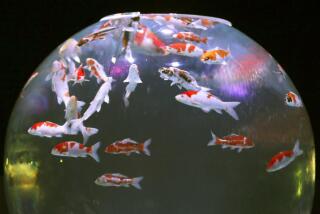Protests May Upset Japan’s Plutonium Plans : Safety: Tokyo hopes to use the fuel to assure energy independence. But furor over shipment could shift opinion.
- Share via
TOKYO — The rising international furor over Japan’s shipping of 1.7 tons of plutonium on the high seas has caught the Japanese by surprise and could upset their plans for using the deadly nuclear fuel to assure their energy independence, officials here conceded Friday.
“Nobody who had been involved in the shipment expected it would get such high public attention,” Toichi Sakata, director of the Science and Technology Agency’s nuclear fuel division, said at a briefing conducted with Japan’s Foreign Ministry and Maritime Safety Agency.
“This shipment gave us a good opportunity to look at international reaction and how the Japanese (plutonium) program is being looked at by other countries.”
The plutonium-bearing ship, the Akatsuki Maru, and its military escort vessel left France last Saturday amid demonstrations by environmentalists and a storm of protest from more than a dozen nations insisting that the cargo ship be kept out of their territorial waters.
A Foreign Ministry official said all this reaction would be taken into consideration when Japan makes its regular review this year of its nuclear policy, about which he noted there are “a variety of opinions” in the government.
But Sakata asserted that the Japanese, despite the current controversy, probably would go ahead with their plans to employ plutonium in their nuclear programs because Japan, a nation with few natural energy resources, has a strong demand for new power sources.
Japan plans to import 30 tons of plutonium from France and Britain in the next two decades as part of a policy to create a complete “nuclear fuel cycle,” which could decrease Japan’s dependence on foreign energy sources. The plutonium, processed from spent nuclear fuel from Japanese power plants, would be used in breeder reactors that produce more plutonium for use in nuclear plants.
Most other countries, including the United States, have dropped plans to use plutonium as a fuel for such facilities because natural uranium is cheaper and safer. Unlike plutonium, for example, natural uranium cannot be easily used in the manufacture of nuclear weapons. Plutonium also is a highly toxic material, so lethal that a speck of it can cause cancer or death in humans if inhaled.
But Japan, already a heavy user of natural uranium, is concerned that the world supply will eventually run out.
The Japanese have insisted that the current plutonium shipment poses no risk to the environment or global safety. They add that their history with nuclear weapons--Japan is the only nation to have suffered an atomic attack--and the intense international inspections that they have encouraged will prevent any possible use of the plutonium for weapons.
But other nations and environmental groups, such as Greenpeace, have raised major concerns about the Japanese program.
Japanese officials vigorously denied Friday that the armed escort of the plutonium ship had provoked a recent incident with a Greenpeace vessel.
And responding to reports that an American nuclear submarine is monitoring the plutonium ship’s journey, a Foreign Ministry official said Japan never requested such help and was unaware of any U.S. plans to provide protection for the vessel. The official also denied reports that America initially insisted that Japan’s escort ship be equipped with more sophisticated anti-missile devices to prevent attacks by terrorists or others.
“The reason the U.S. government gave us the green light (to move the material) is that it was satisfied with our measures,” the official said, adding, “If we cannot provide enough security ourselves, we should not do it.”
Countries around the globe and along potential routes of the ship have objected that they do not want the Akatsuki Maru traveling nearby for fear it may be involved in a disastrous accident, such as a fire, or other incident.
The Japanese already have said the plutonium would stay 200 nautical miles from other countries as it journeys to Japan.
But Japanese officials on Friday also distributed a stack of documents that they said prove that the stainless steel casks that the plutonium is stored in aboard the ship cannot be damaged by a fire, crash or intense water pressure, as would occur if the containers were dropped into the deep sea.
The officials also offered an environmental report that concluded that even if a cask were to crack at the sea’s bottom and plutonium were to make its way into the food chain, the radiation exposure to humans would be minimal and of little harm.
More to Read
Sign up for Essential California
The most important California stories and recommendations in your inbox every morning.
You may occasionally receive promotional content from the Los Angeles Times.













